NDTV Ground Report: Drugs At Centre Of China's 'Three Warfares' Strategy
The Chinese fund and support Myanmar's military junta. The junta in turn hire NSCN (IM) and ZRA to fight on their behalf and provide protection to poppy fields

Athisa Koso is in her 50s and has a ready smile and watchful eyes. Mother to nine, her hands are full but she -- like many other mothers in some states in the northeast region -- has learnt to constantly watch her children closely in silence, looking for changes in behaviour, which would give her a clue as to whether they were in "bad company".
Ms Koso says she had a dream one night. "In the dream, I saw my son taking number 4," she told NDTV.
"Number 4" is the street name for heroin in Nagaland's Dimapur city.
Ms Koso says she began to watch her son and his friends, and found he would hang out with people older than him and even followed them a few times. Over time her suspicions were confirmed. She decided to take matters into her own hands.
"I insisted that he had to be home for dinner with the family and for evening prayers," she says. "With a mother's love, I made him tell me the truth and then sent him to a rehabilitation centre for deaddiction."
Her son has returned home now and is rid of the drug habit. But she continues to watch over him like a hawk.
Every home in this middle class neighbourhood has a drug user, she tells NDTV.
"Every family here is suffering. There is an emotional burden on everyone, but also a financial one."
This is the biggest impact of China's debilitating 'Three Warfares' strategy - pumping drugs into India's northeast to weaken and destroy the fabric of society.
There are countless rehabilitation centres in some of the states in the northeast which are most affected by drug abuse. Children are hooked to a variety of easily available drugs by the time they reach Class 7, data shows.
The source of these drugs?
Armed insurgent groups like the National Socialist Council of Nagaland (Isak-Muivah), or NSCN (IM), and the Zomi Revolutionary Army (ZRA), which bring drugs from Myanmar and China for sale in India.
After the outbreak of ethnic violence in Manipur in May 2023 and the subsequent high security in the state, the point of entry of drugs has shifted from the border trading town Moreh in Manipur to neighbouring Mizoram.
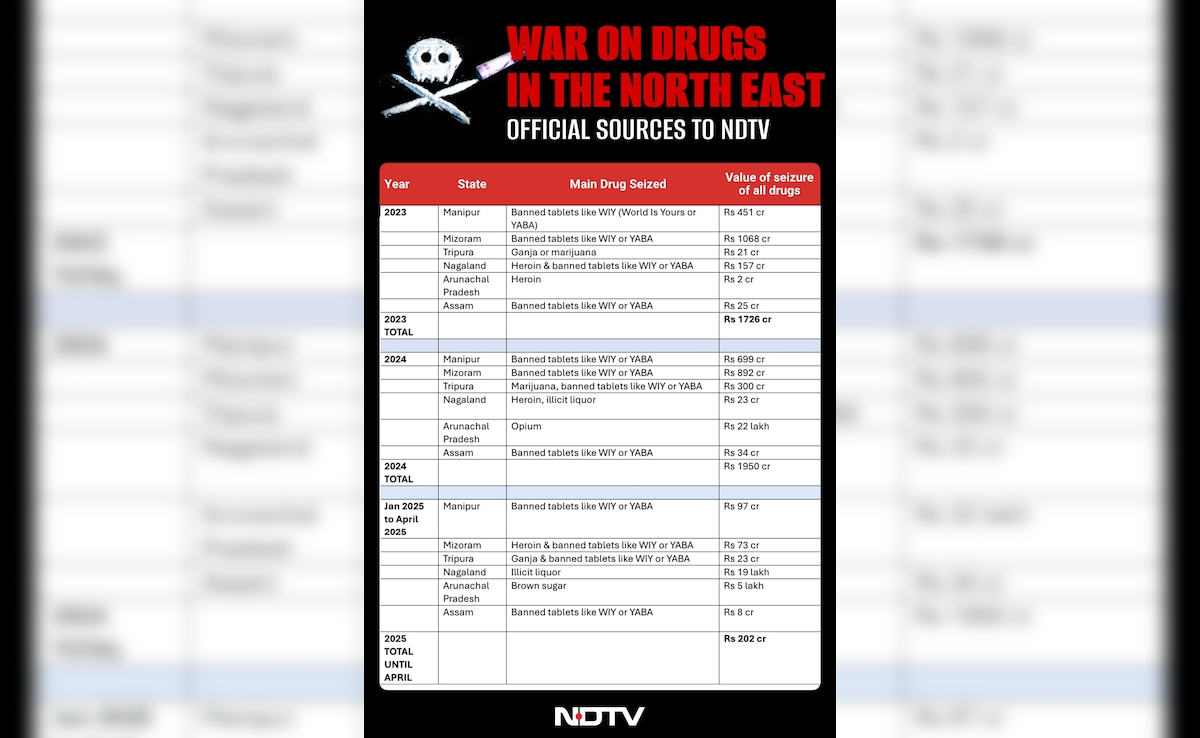
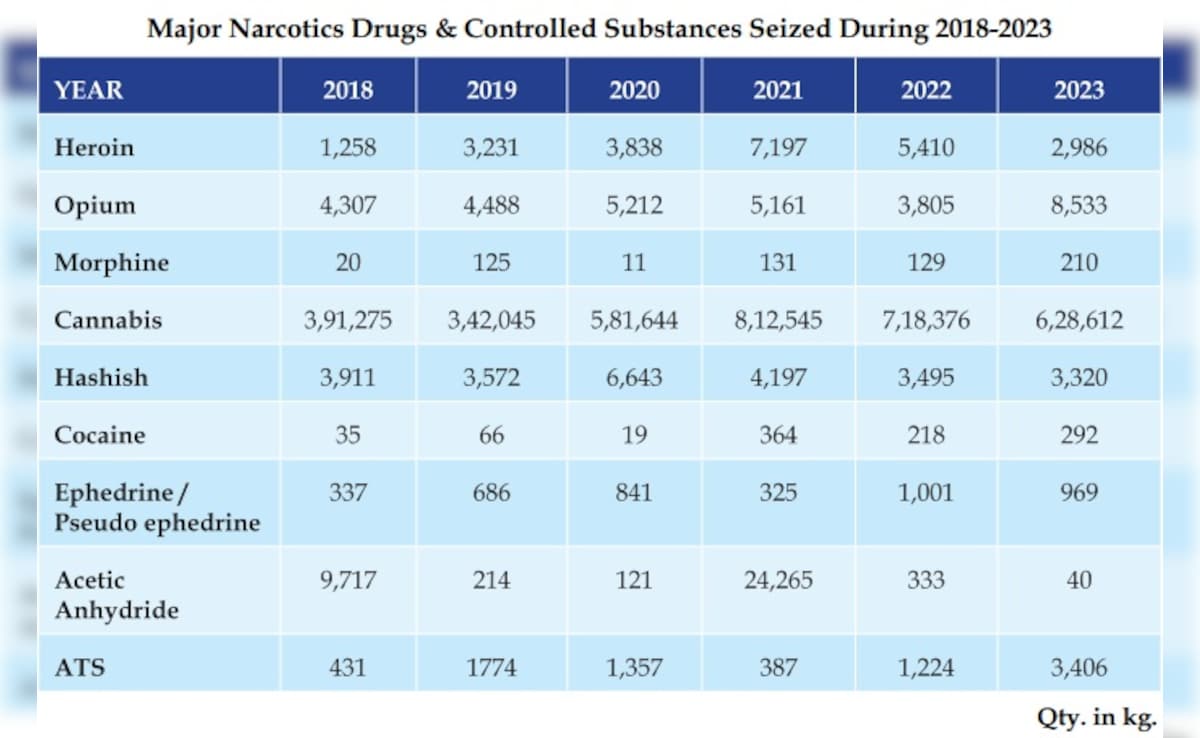
Source: Narcotics Control Bureau Annual Report 2023-24
Rise Of Myanmar In Global Drug Trade With China's Backing
With the Taliban banning illicit cultivation of poppy and opium in 2023, Myanmar has emerged as the world's largest cultivator of opium. According to the United Nations Office on Drugs and Crime (UNODC), Myanmar's opium production was twice that of Afghanistan in 2024.
Over 45,000 hectares of land in Myanmar are under poppy cultivation. From poppy comes heroin and brown sugar.
This is the notorious Golden Triangle or the Death Triangle -- an area where Myanmar, Thailand, and Laos meet. This is a hub of global trade in narcotics.
A vast majority of drugs find its way into India through the northeast states.
The Chinese fund and support Myanmar's military junta. The junta in turn hire Nagaland-based armed insurgent groups like the NSCN (IM) and Manipur-based ZRA to fight on their behalf and provide protection to poppy fields. The ZRA also has a presence in Myanmar.
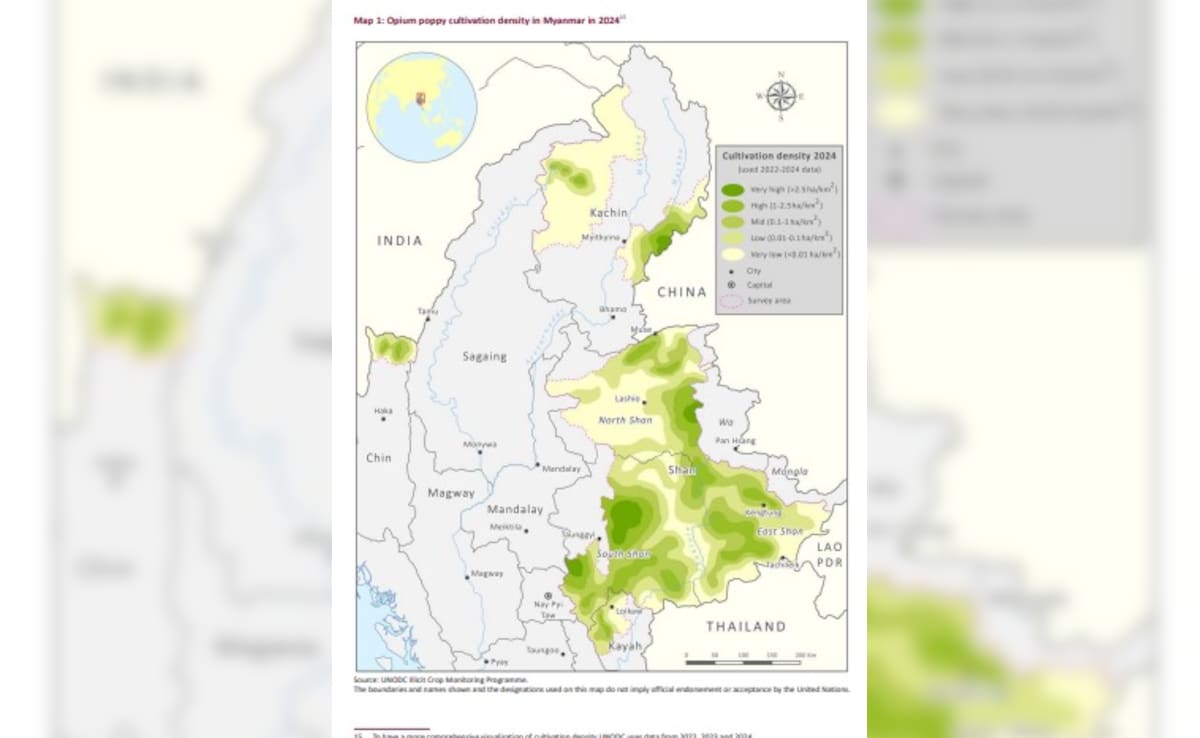
Photo Credit: Credit: UNODC
The ZRA, in particular, manages poppy fields in Myanmar's Chin and Shan areas. They also fight other rebel groups that oppose the ruling military junta.
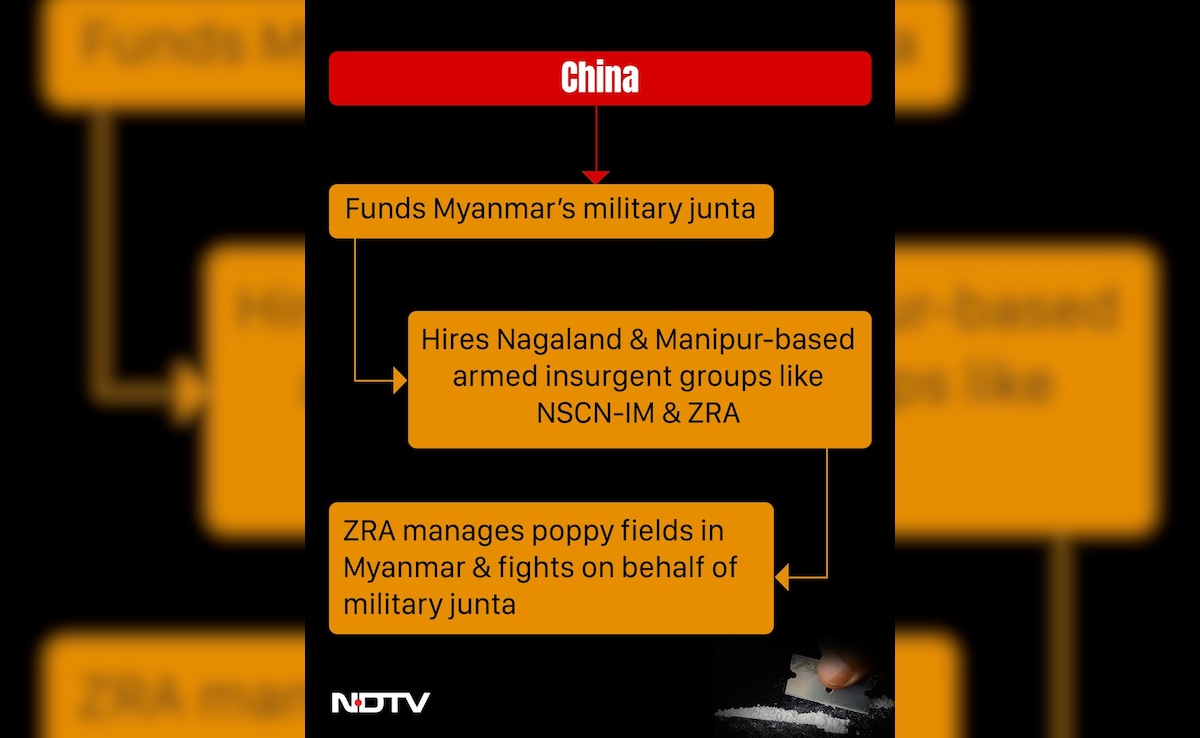
Since the National Unity Government (NUG) was displaced by a coup in 2021, the military junta has controlled most of Myanmar under the name of State Administration Council (SAC).
Armed rebel groups sprang up and formed alliances to counter the violence unleashed by the SAC. One of these rebel groups fighting against the military junta in Myanmar is the Chin National Army (CNA).
This group has trained its guns on the ZRA, which they claim is destroying Myanmarese society by encouraging poppy cultivation. The CNA has captured many areas and set fire to poppy fields which the ZRA protects.
"ZRA works and collaborates with the SAC [military junta]. The ZRA stayed together with SAC in Tedim and Tonzang townships. Last year, we captured SAC camps in Tonzang and Cikha, but the ZRA tried to retake Tonzang township from us," a CNA spokesperson told NDTV.
"Yes, it is true that there is extensive poppy cultivation in these areas for a long time. The Myanmar army, ZRA and some IIGS [Indian insurgent groups] from Manipur collected taxes from farmers," the CNA spokesperson said.
The Human Cost Of Drugs
In the 1970s, heroin flowed freely from Myanmar into India. Users would smoke the opiate. By the 1980s, heroin began to be injected. Marijuana too began to flood the Indian market.
In the 1990s, painkillers like Spasmo-Proxyvon or SP flooded the northeast. Users would powder these tablets, dilute them and inject them. Sharing of needles resulted in a large-scale HIV/AIDS epidemic.
At the beginning of the new millennium, pharmaceutical companies changed the formulation of SP -- it could no longer be diluted and injected. Methamphetamines called YABA or WY - World is Yours - became the next rage.
Since 2020, the most popular choice of drug is 'Shanflower' - a low-quality drug made of heroin - which can be chased (sniffed) or injected. It is called SF in local parlance. This drug is devastating in its addictive properties as at least 95 per cent of SF addicts who undergo rehabilitation eventually relapse, according to state government statistics.
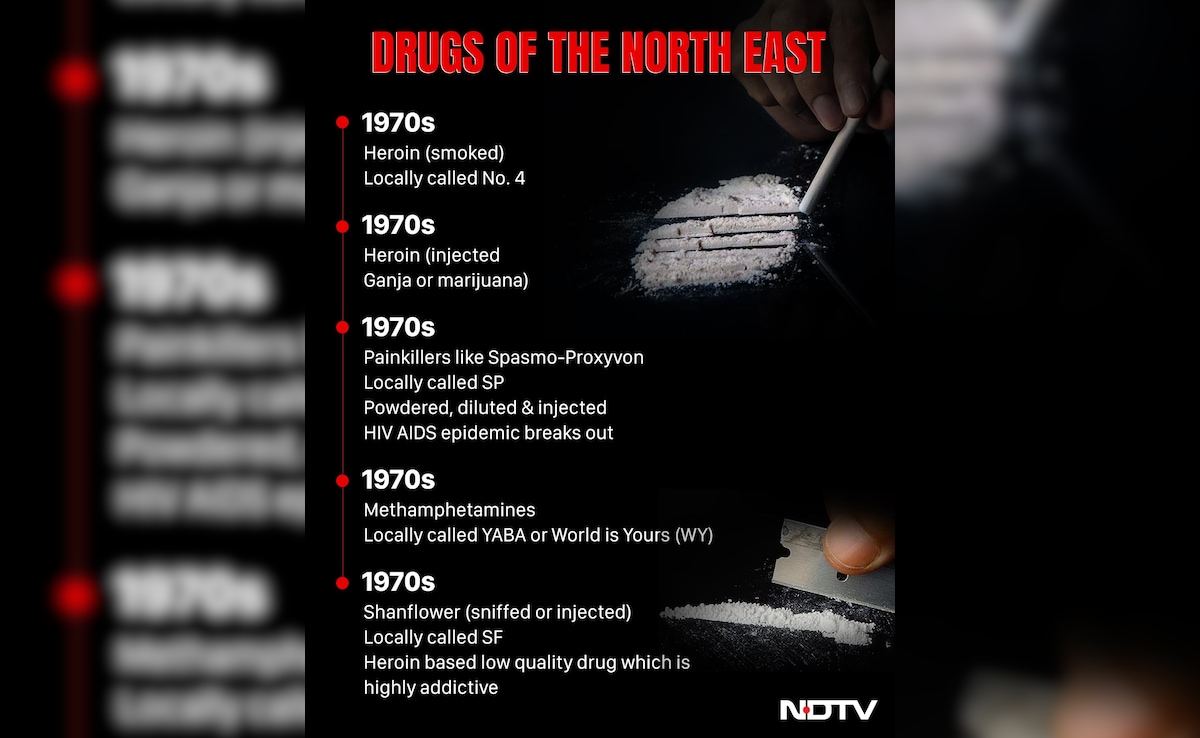
At the Shalom Rehabilitation Centre in Dimapur, young boys attempt to recover from the effects of Shanflower, YABA and alcohol.
"I started using drugs at 17," said James, a recovering addict. "I am now 21. Initially, I started with friends. I used drugs once or twice a week at first. I did not get satisfaction, so I started fixing (injecting). My brother told me not to get into this or my life would get destroyed," he added.
"But I didn't listen. My mental and physical health began to deteriorate. My education was lost. I stopped studying. It led me to stealing my own family's money. All the negative things I had never done before my addiction days, which I never thought I would do one day, I have done under the influence of this drug," he told NDTV.
Another recovering drug user, Jacob, explained how Shanflower is sold.
"This is a container in which we get drugs. Shanflower drug is sold in a tobacco container. It costs Rs 4,000 to Rs 5,000. There are two sides to this container. This will last for a maximum of two days, depending on the user," he said.
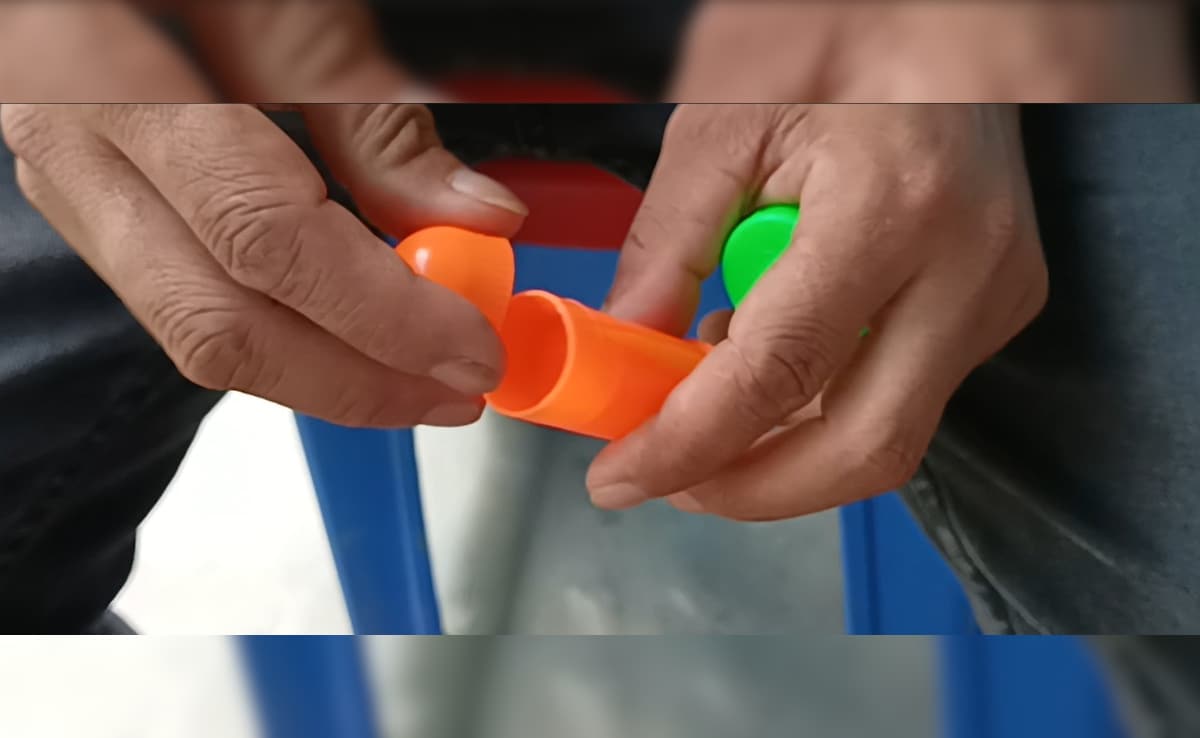
Photo Credit: Sandhya Ravishankar
A resident counsellor at the rehabilitation centre explained the horrors of withdrawals.
"First, there will be tremors. Then joint pains. Most alcoholics hallucinate for a few days. But physically they are very down - both drug addicts as well as alcoholics," said Nikheni Hriiyikho Anthony, counsellor at Shalom Rehabilitation Centre, a facility run by the Roman Catholic church.
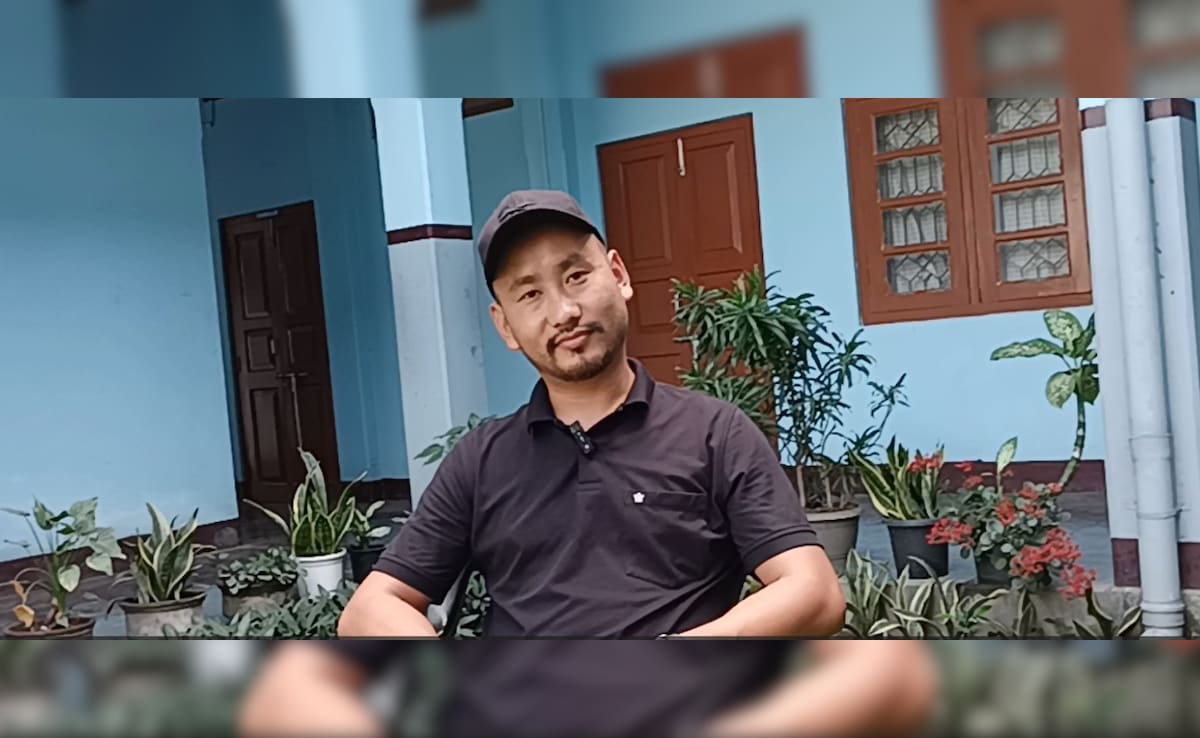
Photo Credit: Sandhya Ravishankar
Father Joseph Mariadhas, who runs the centre and has worked with drug addicts for over three decades, told NDTV the situation was dire.
"Shanflower has taken a deep root here. It is very alarming. In every family there are at least one or two people who are into substance abuse. It is not about rural or urban; this drug is everywhere and it is very alarming. It is urgent to make some interventions," he said.
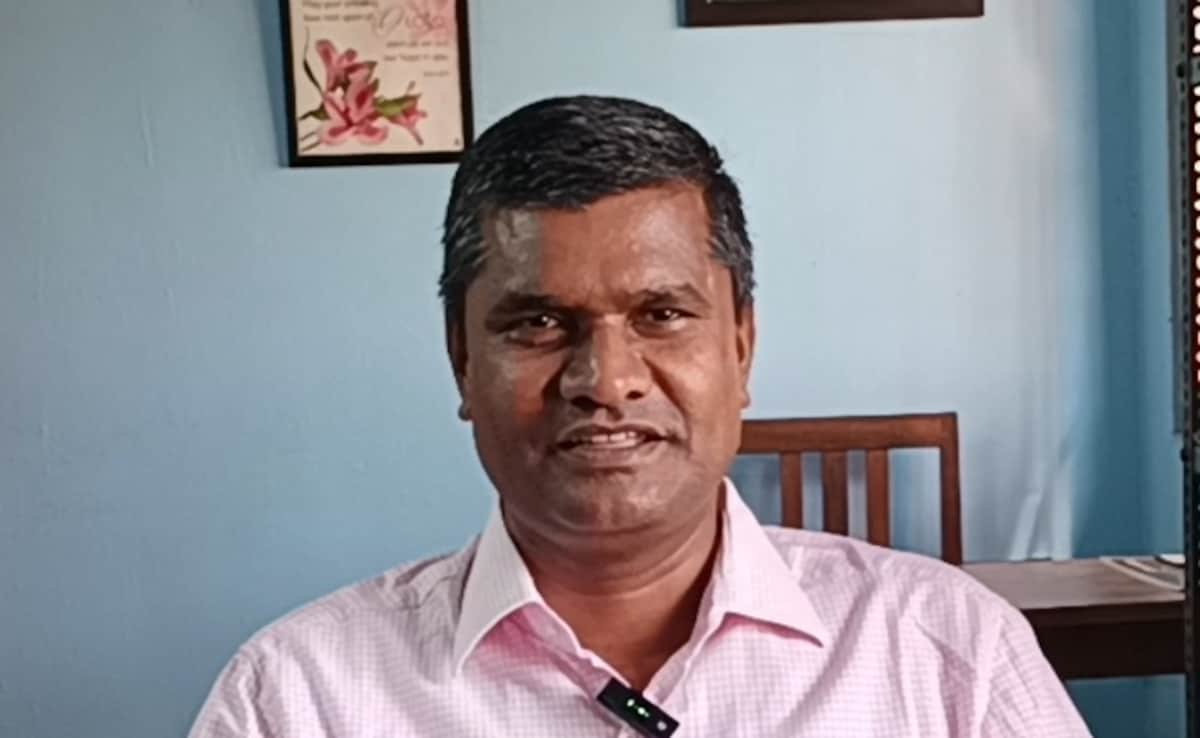
Photo Credit: Credit: Sandhya Ravishankar
Lack of stringent action to stop the flow of narcotics into the northeast would lead to China winning the unconventional war on India.
-
Opinion | What's Driving Pakistan-Afghanistan War? Islamabad's Never-Ending Cycle Of Insecurity
Islamabad has accused Kabul of drifting into an "India colony", a charge that was further sharpened following Afghan Foreign Minister Amir Khan Muttaqi's visit to New Delhi last year
-
Behind Arvind Kejriwal's Freedom: The 'South Group' Tag, A US Drugs Case
Special Judge Jitendra Singh also asked searching questions of the Central Bureau of Investigation, the federal agency tasked with building the corruption case against Kejriwal.
-
Opinion | The Hypocrisy Of Pakistan And Turkey's Frustration With India-Israel Ties
Even before the conclusion of PM Modi's visit, editorials and op-eds appeared in Pakistani and Turkish media, indulging in fear-mongering about India and Israel's deepening ties.
-
Soviet Union, US Coalition, And Now Pakistan: Afghan Military's New Test
Pakistan would have the upperhand in a short, conventional war. But if history is any indicator, Afghanistan can bleed Pakistan in a prolonged guerrilla warfare condition
-
Arvind Kejriwal Won The Case That Cost Him His Job
Months of drama followed Kejriwal's arrest, including allegations of medical negligence and the AAP claiming the BJP was trying to 'kill' him in prison by denying him insulin.
-
Opinion | Why Social Media Platforms Must Share The Wealth Others Create For Them
There are an estimated 2-2.5 million active digital creators in India. Yet only 8-10% effectively monetise their work.
-
Opinion | Congress's 'Jamaat' Experiment In Kerala Can Backfire Badly. But Does It Care?
The Jamaat has always been sort of a political pariah in the state. Why, then, is the Congress warming up to it?
-
Opinion | A BAFTA Award, Straight From The Ashes Of Manipur's Moreh
The shooting for 'Boong' in Moreh wrapped up barely a week before violence engulfed the township. Many who stood behind and before the camera are today internally displaced.
-
Inside Mumbai's Worsening Air Pollution Crisis
Mumbai Air Pollution: Mumbai 's overall Air Quality Index (AQI) on February 25 remained in the poor to unhealthy range.
-
Opinion | What's In An 'M'? The Empty Performance of Renaming Kerala
The 'm' at the end of Keralam will not stop the sea from encroaching, it will not fill the coffers of the state treasury, and it will not provide a bed in a super-specialty hospital.
-
News Updates
-
Featured
-
More Links
-
Follow Us On










